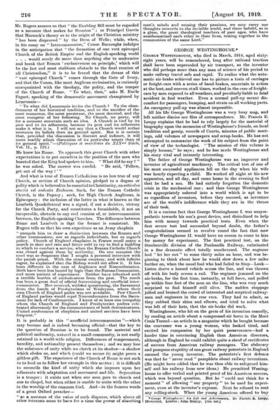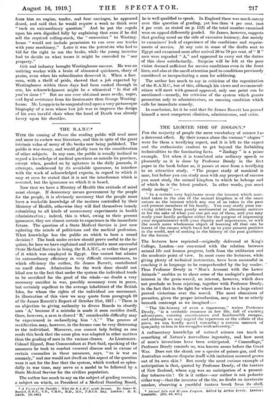GEORGE WESTINGHOUSE.*
GEORGE WESTINGHOUSE, who died in March, 1914, aged sixty- eight years, will be remembered, long after railroad traction shall have been superseded by air transport, as the inventor who did perhaps more than any man of science of his period to make railway travel safe and rapid. To realize what the auto- matic air-brake achieved one has to picture a train of carriages or freight-cars with a series of hand-brakes, uncertain in action at the best, and uneven at all times, worked in the case of freight- cars. by men exposed to all weathers, and peculiarly liable to fatal accident in foul weather. Even a normal pull-up meant dis- comfort for passengers, bumping, and strain on all working parts. An emergency pull-up was almost impossible.
All his life George Westinghouse was a very busy map, and left neither diaries nor files of correspondence. Mr. Francis E. Leupp explains that he had to rely largely for the material of biography upon the memories of Westinghouse's friends, on local tradition and gossip, records of Courts, minutes of public meet- ings, odd volumes of newspapers and scrap-books. He has not attempted to summarize the work of his subject from the point of view of the technologist. " The mission of this vclume is simply human," he says ; and he has made Westinghouse and his story vital and intensely interesting.
The father of George Westinghouse was an improver and inventor of agricultural machinery. The critical test of one of his most successful appliances fell on the day when his wife VMS hourly expecting a child. He worked all night at his new apparatus, and all day, and came home in the evening to find that he had a son. He had entirely forgotten the domestic crisis in the mechanical one ; and thus George Westinghouse was appropriately ushered into a world which is apt to be as regardless of inventors, before they succeed, as inventors are of the. world's indifference while they are in the throes of their task.
It is a curious fact that George Westinghouse I. was unsym- pathetic towards his son's great device, and disinclined to help him with money towards practical tests. Even when the first severe test had succeeded beyond doubt, the father's congratulations seemed to revolve round the fact that now George Westinghouse II. would have no reason to come to him for money for experiment. The first practical test, on the Steubenville division of the Panhandle Railway, culminated in a fine dramatic effect totally unrehearsed. The engineer had " let her out " to some thirty miles an hour, and was be- ginning to think about how he would slow down a few miles further on, when the usual fool who had failed to Stop—Look- Listen drove a horsed vehicle across the line, and was thrown off with his body across a rail. The engineer jammed on the air-brake, for the first time, instantly, at full force, and pulled up within four feet of the man on the line, who was very much surprised to find himself still alive. The sudden stoppage jolted and bruised the crowd of interested and sceptical railway. men and engineers in the rear cars. They had to admit, as they rubbed their shins and elbows, and tried to salve what was left of their hats, that the air-brake did work.
Westinghouse, who hit on the germ of his invention casually, by reading an article about a compressed-air borer in the Mont Cenis Tunnel—an article in a magazine which he bought because the canvasser was a young woman, who looked tired, and excited his compassion by her quiet perseverance—had a harder time in convincing English than American directors, although in England he could exhibit quite a sheaf of certificates of success from American railway managers. The obduracy and pompous stupidity of one great railway potentate in England amused the young inventor. The potentate's first defence was that he " never read " pamphlets about railway inventions. (He might have added that he was thus able to safeguard him- self and his railway from new ideas.) He permitted Westing-. house to offer verbal and printed proof of his American success, which was beyond question. But he " could not think for a moment " of allowing " our property " to be used for experi- ment, even at the inventor's expense. Next he refused to rent any rolling-stock. When the young American offered to buy • George Westinghouse: his Life and Achieve-meats. By Frauds E. Leupp. Illustrated, London: Jolui Murray. 115s. uot.1
from him an engine, tender, and four carriages; he appeared .dazed, and said that he would require a week to think over " such an extraordinary question." And he put the cupola upon his own dignified folly by explaining that even if he did sell the required rolling-stoOk, the " concession " to Westing- : house " would not include permission to run over our tracks with your machinery." Later it was the potentate who had to . bid for the right to use the brake, while the young inventor had to decide on what terms it might be conceded to ." our property." •
Grit and industry brought Westinghouse success. He was an untiring worker with a brain of abnormal quickness, chary of praise, even when his subordinates deserved it. When a fore man, with a thrill of pride, showed that a job expected by Westinghouse within three days had been rushed through in one, his acknowledgment might be a. whimsical " Is that all you've done ? " But no one ever obtained more ready, eager, and loyal assistance from his lieutenants than George Westing- house. Mr. Leupp is to be congratulated upon a very picturesque biography of a man whose last job was to improve the design of his own invalid chair when the hand of Death was already heavy upon his shoulder.



































 Previous page
Previous page